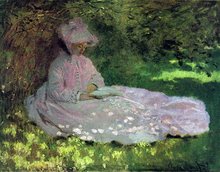What a delightful read! I not only had the print version but the book-on-CD version, so I got to "hear" Sarah's words as well as read them. I suspect, however, that this double-reading of sorts may have prevented me from seeing Sarah's spelling improve over the course of her story. I would happily read the follow-ups to this story, as Amanda tells me they exist. That makes me happy. For now, I will tackle the questions and wax academic.
1. Had it been written in the third-person, this book would change my relationship with Sarah and the other characters. It's hard to say if those relationships would change for the worse. Would I not feel as close to Sarah if I didn't get to read her, writing nakedly in black and white? In terms of character, there can be a sense of mystery in novels that use the third-person. The reader cannot know all a particular character is thinking. (Of course, the same could be argued for first-person narratives. But first-person points of view do tend to reveal more of an honest character: how she thinks and feels, for one.) Third-persons can leave the reader guessing. With Sarah, we did not have to guess how she truly felt about things. She was so frank in her journal (and with others). On the other hand, third-person narratives can be more illuminating when it comes to action. In this novel, the reader might have more information about what exactly Jack was doing out there in Mexico. We might have gotten more history had this book been written from a third-person point of view. I think I have successfully written in the first-, second-, and third-people (!) in this answer.
2. I don't remember exactly how education changes Sarah, besides the fact that she derives a sense of pride from her academic accomplishments. And, as I alluded to earlier, it may have improved her spelling. Education certainly changes her family; her brother went on to become an architect in San Francisco. Sarah's mentions of the Board of Normal Education and the new university in Arizona lead me to believe that she will further pursue her own studies. It seems to me, though, that her greatest "education" was not academic but experiential. Her life itself was her university. Her classes were not Art History or German, but Economics, History of the American West, Botany, Animal Husbandry. I got a great sense of her awe and wonder toward education, and her accomplishments in life as well as "school" prove to me that her mind was top-notch.
3. A physically handicapped friend (she had no use of her arms and used a wheelchair to convey herself) once complained to her mother on the phone: "I'm not special. I just do what I need to do every day to survive." She was griping about her alma mater's recent invitation to come and speak to graduates at an upcoming ceremony. I compare this attitude (of humility, perhaps?) to that of Sarah's in a way. Sarah had little choice but to do what she did to survive. Fortunately, she had enough steel and wits to make it a success. Did Sarah have determination and courage, as the back of this book describes heroism? I felt she did. She was very resilient. At many points, she could have just given up. But she had this sense of determination that was intense. She just kept putting one foot in front of the other, even though she was scared. And that's courage in my book. As for her mother, it seems like it was self-preservation that led her to isolate herself. She eventually healed. But I have to note that she did so only when someone else (Sarah) "dropped the ball." Her mother had to step up. I think that is how many of us grow: When we have to step up and take responsibility.
4. Sarah and Jack are up there with Jane and Mr. Rochester, Elizabeth and Mr. Darcy. The spark between them was palpable. As for the time-pieces, I guess the obvious answer is that they were always waiting for each other. Sarah had to wait for Jack to come home all the time. Jack had to wait for Sarah to realize she was in love with him. (And also for her husband to die!) I think also they knew their time together was precious. They always had an eye on it.
The book, "The Duchess," was just a fabulous inclusion. It seemed that as long as Jack had the book, he had a part of Sarah. At first, it seemed a sort of insurance policy. He knew how she longed for the book. She would always pursue it. I think, too, the promises and wonder of that single torn page really gave Sarah a sense of hope of things to come, of possibilities. I think her horizon opened tremendously just from that single page. Her sense of wonder, too, at this page, revealed an innocence and tenderness that really made her a lovable character. Consequently, it was a lovable book.
Monday, November 19
Subscribe to:
Post Comments (Atom)

1 comment:
Great post, Danielle.
Agreed the Dutchess book was an awesome detail throughout the journals. That unfinished letter made me cry. I thought when she found the book again that she'd find the letter finished this time. Oh well, it was still a great ending to the book.
Post a Comment